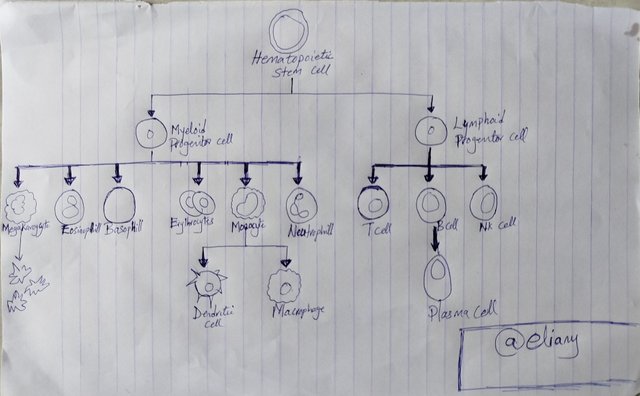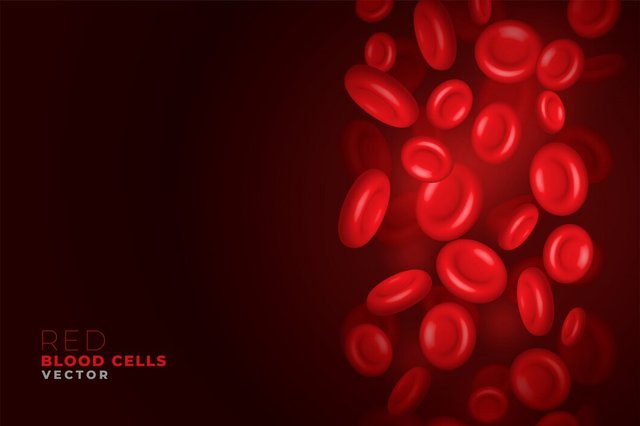SEC S20W1 || Hematopoiesis - Module 1
It interest me to take part in this week health contest, although hematology is not my field, I still enjoy reading it and refreshing my brain in this field. After reading and understanding the course I decided to make my entry in regards to the homework questions.
Let's begin;
Hematopoiesis is the process of creating or formulation of new blood cells naturally from stem cells as your body requires. As you grows, your body makes new blood cells on a continuous process to replace the old blood cells which enables you to have a steady healthy blood supply to the body.
This red blood cells helps to supply oxygen to the tissue while the white blood cells fight infections in the body and the platelets helps to clot blood when injured.
Hematopoetic organs
- Bone marrow
- Embryonic yolk sac
- Liver
- Spleen
- Thymus
- Lymph nodes
Functions of Hematopoetic organs
| Organs | Function |
|---|---|
| Embryonic yolk sac | formulation of blood cells in the uterus from 19 days after fertilization for the embryo. This helps in the growth of the embryo. |
| Liver | this is the main organ which produces blood cells during pregnancy. It formulate blood needed for the fetus growth under one month and till birth. The liver also produces the red blood cells, the white blood cells and the platelets. |
| Spleen | still continues Hematopoetic activities in the 6 weeks of pregnancy and in later years of human life, the spleen continues to fights infection by filtering the blood and removes any damage blood cells detected and controls blood cells level in the body. |
| Thymus | protects the blood cells against any foreign antigens while producing blood cells in puberty age |
| Lymph nodes | formulations of blood cells while filteration |
| Bone marrow | Formulate blood cells in the bone |
| Medullary Hematopoiesis | Extramedullary Hematoesis |
|---|---|
| Blood formation occurs in the bone marrow and blood is released to the bloodstream. | Blood formation occurs outside the bone marrow, it occurs when there is no adequate protection of blood cells. |
| Is normal | Is a rare disorder in some cases. |
| Takes place in the inner bone | Takes place in the liver or spleen |
Just as explained in the course outline by the teacher, hematopoiesis is the development or formation of red blood cells beginning from the embryonic yolk sac and it continues till adulthood and remain stable keeping blood supply replenish.
See the diagram below 👇 for explanation

The above diagram shows the different development stages of blood formation in human body. Where stem cells produced other cells and are then differentiated into two path ways till matured cells are produced.
Hematopoesis stem cell, (HSC) differentiate into Lymphoid also know as lymphocyte colony-forming units (CFU-L) and myeloid also know as granulocyte-monocyte myeloid colony-forming units (CFU-GMM) which further differentiate into progenitor due to lost of self renewal capacity to a particular cell lineage.
Therefore, the lymphoid differentiate to T-cells, B-cels and NK cells (natural killer). While the Myeloid stem cells generate progenitors of red blood cells and white blood cells.
| Red blood cells | white blood cells |
|---|---|
| erythrocytes | neutrophils, basophils, monocytes, eosinophils, mast cells, dendritic cells), and platelets. |
Case study; A 25-year-old male patient comes into the emergency room of the Ruiz y Páez University Hospital Complex with bruises all over his body from a car crash. He is given an order for tests requesting a complete blood count, blood glucose, urea, creatinine, glomerular filtration rate, and lipid profile. The test results show significant blood loss and type 2 diabetic nephropathy. X-rays are also performed showing a fractured femur. Explain the following in your own words:
In your opinion, what are the reasons for significant blood loss?
Who would be the ideal person to donate blood to?
Clinical case question 1; Significant blood loss is caused by the bruises all over the body as the result of a car crash.
For further investigation, x-ray tes was ordered and the result has confirmed that there is a fractured femur. Ofcourse femur is one of the hematopoietic organs, therefore this shows the main reason to loss significant blood especially if it pierced through the skin.
Clinical case question 2; Blood transfusion is required due to the significant blood loss, to proceed with the donation, the blood group of the patient needs to be confirmed. Then depending on the patient blood group, the donors blood need to be screened for cross matching and cell compatibility to know who is an ideal person to donate to the patient.
Then if the cell is compatible, the donor will go ahead to donate. Even though O- is the universal blood type of which it won't trigger any antigens when given to a person of any blood type, the patient has to be screened before receiving any transfusion even in any cases of emergency.
For example if the patient is O- the donor must to be O- as well. However, blood screening should be done immediately to select an ideal donor. Even if O- donor is available, before carrying out the transfusion, cross matching and cell compatibility is carried out to determine if the cells are compatible before donating.
I so much appreciate discuss as it helps me to reflect some of those medications that are used to treat the different cases of anaemia.
My Observations
I also have a little observation @dexsyluz, Is this topic not too though for users that are not medical professionals? Because from my experience of writing this post, I discovered that it will not be easy for people who are not in the medical field to understand this very well, most especially some medical terms.
For the clinical case, I also think it will not be easy for them to understand because personally I answer this question based on my experience in the hospital setting. As a pharmacist, I don't really know much in laboratory so even though the person is a medical professional, laboratory terms is not known by everyone who is not in this field. How about choosing a general medical topic that will interest other users, they will even benefit from it and is easy for them to write using their own words without searching online?


Se puede apreciar que tiene conocimientos en el área, pues nos ha presentado la infromación de una forma concreta y en un lenguaje claro fácil de entender para quienes no manejamos los tecnicismos médicos.
En cada etapa de nuestra vida hay órganos responsables de la producción de células sanguíneas, y cada uno de ellos responde ante distintas situaciones que pudiesen presentarse, tal como usted nos lo explicó con su diagrama.
Concuerdo con usted que este es un tema muy técnico, pero sin dudas incentiva a la investigación y con ello el conocimiento.
Éxitos en su participación.
Oh that is fine, thank you so much I really appreciate your comments 👍🤗🤗🤗
Thank you for your wishes
Hi! I am not an expert on the subject either, in fact I am still in high school, but it is good to read other people who, like me, participate in this course with the intention of learning more or refreshing their knowledge on this interesting subject. I wish you the best of luck in this and each of the coming weeks.
Have a nice day!
I'm grateful you learn something from it thank you
TEAM 5
Thank you @damithudaya for the vote I appreciate
Has compartido un post ligero de leer, con contenido que seguro es fácilmente comprensible para la mayoría, a pesar de ser un tema bastane complejo.
También soy de pensar que el tema, o la manera de abordarlo, es bastante complicado, para poder entender a plenitud, incluyendo el caso clínico, hay que ser profesional de la salud o estar en un grado avanzado de los estudios de esto.
Pero aquí seguimos, esperemos a ver como avanza todo. Seguro que la pasaste bien al retomar estos estudios, y refrescar conocimiento al respecto. Saludos.
Yes sure let's be hopeful, I really enjoyed my time refreshing this theory because for over 5 years now, I've been practising. Thank you for stopping by my post I appreciate your encouraging words.
Hola querida Eliany👋.
Un placer haber leído tu post , está muy bueno, fácil y práctico.
Comparto tu punto de vista con respecto a el grado de dificultad para las personas que no son profesionales de la salud.
Espero coincidamos en el siguiente módulo.
Saludos y muchas bendiciones 🙏
Oh yea sure we hope for for good changes
Thank you for stopping by my post